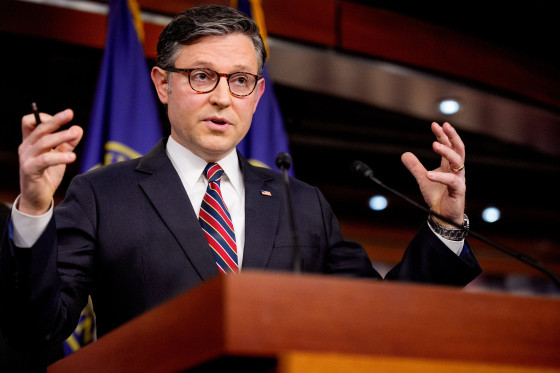WASHINGTON — House Republican leaders canceled plans to vote on a revised budget blueprint Wednesday to begin work on President Donald Trump's sweeping legislative agenda as a key bloc of hard-line conservatives threatened to tank the measure.
It's a major setback for Speaker Mike Johnson, R-La., who had projected confidence throughout the day and huddled with a group of holdouts who were pushing for steeper spending cuts for over an hour before the scrapped vote, and for Trump, who dialed up the pressure in recent days on House Republicans to fall in line.
Johnson said he would try to bring the budget resolution, which the Senate adopted last week, to the floor in the narrowly divided House on Thursday, instead.
"This has been a very constructive process," Johnson said. "We’re working through — we want all members to be not just comfortable with but, but happy about the final product."
Follow live politics coverage here
Johnson added that he kept Trump in the loop but that the president didn't call into his discussion with the holdouts Wednesday evening.
“I stepped out to a side room and told him exactly what was going on. He’s very supportive of us working together,” Johnson said.
Republicans hope to use their party-line bill to pass trillions of dollars in tax cuts and hundreds of billions of dollars in new spending on immigration enforcement and military expansion. They also want to lift the U.S. debt ceiling by as much as $5 trillion.
The main source of division between House and Senate Republicans is spending cuts. The Senate measure requires a minimum of $4 billion in cuts, while a budget blueprint the House passed this year called for $1.5 trillion to $2 trillion in cuts. While Senate GOP leaders insist their blueprint is just a minimum and not a target, House conservatives distrust them and argue the plan would explode the national debt.
The two chambers can’t begin crafting the specifics of the legislation until they pass identical budget resolutions.
There was a flurry of behind-the-scenes action before Wednesday's scheduled vote. Members of the far-right House Freedom Caucus huddled behind closed doors in a House office to discuss their strategy. Several Freedom Caucus leaders, including Chairman Andy Harris, R-Md., Chip Roy, R-Texas, and Scott Perry, R-Pa., then walked across the Capitol to the office of Senate Majority Leader John Thune, R-S.D., where they sought commitments in writing on spending cuts.
After the evening vote series began, Johnson was spotted in the House chamber trying to wrangle holdouts and steer them into his ceremonial office just off the floor. It took him many tries.
The holdouts met with Johnson and his leadership team for more than an hour, but they failed to reach an agreement to move forward.
Trump also got more involved this week, meeting with a group of holdouts at the White House on Tuesday and imploring Republicans to support the measure later in the evening at a fundraising dinner. He shared a similar message in a pair of posts on his Truth Social site Wednesday morning.
“Republicans, it is more important now, than ever, that we pass THE ONE, BIG, BEAUTIFUL BILL,” Trump wrote. “The USA will Soar like never before!!!”
Several times this year, Johnson and Trump had been able to sway GOP rebels at the last minute to pass critical legislation, including a bill to avert a government shutdown and the House's own budget resolution.
But the new budget plan is proving to be a more difficult feat, with conservative hard-liners digging in on spending cuts. Harris, the chairman of the Freedom Caucus, said he hadn’t spoken to Trump on Wednesday.
"For me, this is just an issue between the House and the Senate," Harris said before the meeting with Thune.
Republicans move to prevent votes on blocking Trump's tariffs
Earlier Wednesday, the House voted 216-215 to tee up a final vote on the budget plan, with three Republicans joining all Democrats in opposition. But several GOP lawmakers who backed the procedural move said they would vote against blueprint on the floor.
As part of that procedural "rule" vote, the House also barred a vote to terminate the emergency declaration that Trump used to impose aggressive tariffs on goods from around the world. The tariff agenda was in flux Wednesday as Trump announced a 90-day pause on countries that weren’t retaliating and escalated U.S. tariffs on China to 125%.
Tucked inside the "rule" is language that would bar the House from voting through Sept. 30 on a joint resolution to revoke the declaration on April 2, which Trump labeled “Liberation Day.”
Democrats are seeking to cobble together a majority of lawmakers to circumvent Republican leaders and force a vote on undoing the tariffs. It means any lawmaker who backed the “rule” to bring the budget resolution to a vote also voted, in effect, to protect Trump’s tariff power until October.
Rep. Greg Meeks of New York, the top Democrat on the Foreign Affairs Committee, introduced a resolution Tuesday to terminate the April 2 emergency. So far Meeks has 36 co-sponsors, all Democrats. But some Republicans, like Rep. Don Bacon of Nebraska, have expressed interest in giving authority over tariffs back to Congress.
The two issues came to a head just before Congress seeks to break for a two-week recess, with Republican leaders eager not to send members home empty-handed on the budget.
Johnson defended his attempt to block votes to undo Trump's tariffs, arguing he needs some time to accomplish his objectives on trade policy.
“I’ve made it very clear. I think the president has executive authority. It’s an appropriate level of authority to deal with the unfair trade practices. That’s part of the role of the president, is to negotiate with other countries,” Johnson said Wednesday. “I think that is an America First policy that will be effective, and so we have to give him the space to do it.”



